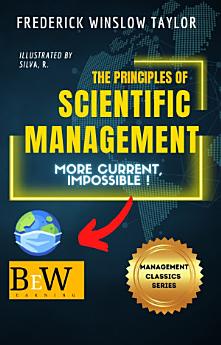The Principles of Scientific Management (Illustrated): More current, Impossible!
3/2022 · BEW Learning
E‑kniha
81
Počet strán
family_home
Vhodné
info
reportHodnotenia a recenzie nie sú overené Ďalšie informácie
Táto e‑kniha
Increasingly, business success depends on good management. And keep in mind that the 'business' here can be a company, a non-profit organization, a company, or even a personal project.There are methods that become disposable and obsolete over time. But in the case of the principles of scientific management you will realize that their pillars are still increasingly valid, needing only to contextualize for the technologies currently used, but the need to treat management more and more as science continues.Several companies fail before completing their second year. Many people try to put their ideas into practice in an amateur way and end up frustrated. In this book, which is a classic of administration, you can observe important concepts such as:1. Leadership2. Productivity3. Division of labour4. Study and times and movements5. Creation of standardized operating procedures6. Need for training and training7. The need for collaboration between managers and employees.8. The importance of planning activities, among others.Want an example of how important this is? Look at the case of the covid-19 pandemic: how important was the planning work, the division of labor, increasing efficiency in large-scale vaccine production. Definition and standardization of hygiene procedures for the population among other things.For a long time, the ideas of scientific management were criticized because they claimed that only managers should think and that workers should only learn and execute, without question.In this book you will see that, even in Taylor's original ideas, there was room for workers to submit proposals to improve processes and that such proposals should be carefully analyzed by management.
O autorovi
Frederick Winslow Taylor (March 20, 1856 – March 21, 1915) was an American mechanical engineer. He was a mechanic and laborer, he graduated as a mechanical engineer studying at night. He wrote the book 'The Principles of Scientific Management', published in 1911. He is considered 'the father' of Scientific Administration, for proposing the use of Cartesian scientific methods in business administration. His focus was efficiency and operational effectiveness in industrial and commercial administration.
Ohodnoťte túto elektronickú knihu
Povedzte nám svoj názor.
Informácie o dostupnosti
Smartfóny a tablety
Nainštalujte si aplikáciu Knihy Google Play pre Android a iPad/iPhone. Automaticky sa synchronizuje s vaším účtom a umožňuje čítať online aj offline, nech už ste kdekoľvek.
Laptopy a počítače
Audioknihy zakúpené v službe Google Play môžete počúvať prostredníctvom webového prehliadača v počítači.
Čítačky elektronických kníh a ďalšie zariadenia
Ak chcete tento obsah čítať v zariadeniach využívajúcich elektronický atrament, ako sú čítačky e‑kníh Kobo, musíte stiahnuť príslušný súbor a preniesť ho do svojho zariadenia. Pri prenose súborov do podporovaných čítačiek e‑kníh postupujte podľa podrobných pokynov v centre pomoci.







